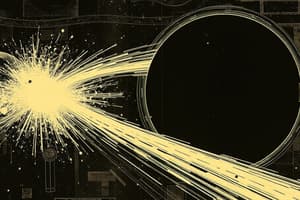Podcast
Questions and Answers
What effect does a black hole have on time for objects near its event horizon?
What effect does a black hole have on time for objects near its event horizon?
- Time remains the same regardless of distance.
- Time passes faster near the event horizon.
- Time stops entirely beyond the event horizon.
- Time slows down significantly. (correct)
Which statement correctly describes the event horizon of a black hole?
Which statement correctly describes the event horizon of a black hole?
- It is a physical barrier for objects.
- Objects can escape once they cross it.
- It is visible and detectable with the naked eye.
- It represents the point of no return. (correct)
How does light behave in the gravitational field of a black hole?
How does light behave in the gravitational field of a black hole?
- It can be stopped by other objects.
- It travels at a constant speed. (correct)
- It escapes the gravitational pull.
- It increases in speed.
What can be observed through the frequency shift in radio waves from a probe orbiting a black hole?
What can be observed through the frequency shift in radio waves from a probe orbiting a black hole?
What principle of general relativity relates to the experience of observers in different reference frames?
What principle of general relativity relates to the experience of observers in different reference frames?
What does the bending of space-time allow light to do near a black hole?
What does the bending of space-time allow light to do near a black hole?
What hypothetical challenge exists in interacting with the event horizon using a long pole?
What hypothetical challenge exists in interacting with the event horizon using a long pole?
What happens to pressure waves when they reach the event horizon of a black hole according to one theory?
What happens to pressure waves when they reach the event horizon of a black hole according to one theory?
Flashcards
Event Horizon
Event Horizon
The point of no return for objects falling into a black hole. Once an object crosses it, it can never escape, even with the most powerful engines.
Time Dilation near Black Holes
Time Dilation near Black Holes
The warping of space-time around a black hole causes time to slow down significantly for objects near it. This effect is more pronounced closer to the black hole.
Principle of General Relativity
Principle of General Relativity
The concept that the laws of physics should remain the same, regardless of an observer's reference frame. This applies to time dilation near black holes, where the observed time depends on the observer's location and motion.
Light Speed and Gravity
Light Speed and Gravity
Signup and view all the flashcards
Individual Space-Time
Individual Space-Time
Signup and view all the flashcards
Space-Time Distortion by Black Holes
Space-Time Distortion by Black Holes
Signup and view all the flashcards
Determining the Event Horizon
Determining the Event Horizon
Signup and view all the flashcards
Interacting with the Event Horizon
Interacting with the Event Horizon
Signup and view all the flashcards
Study Notes
Space-Time Distortions
- Everyone experiences space-time differently, preventing truly shared experiences.
- Black holes warp space-time dramatically, leading to different behavior near them than far away.
- This warping influences how time functions in the black hole's surroundings.
Time Dilation Near Black Holes
- Time passes significantly slower near black holes compared to further afield.
- Near the event horizon, time slows down more than further away.
- Radio wave frequency shifts from a probe orbiting a black hole support time dilation.
The Event Horizon
- The event horizon marks the point of no return for objects falling into a black hole.
- Escape is impossible, even with powerful engines, after crossing the event horizon.
- The event horizon's location can be estimated using calculations involving the inner-most stable circular orbit (ISCO) and the photon sphere.
Gravity and Light Speed
- Light maintains constant speed even near black holes.
- Time slows down in a black hole's gravitational field, ensuring light's constant velocity.
- Space-time's bending causes light to travel through extra dimensions, slowing it down in our perceived dimension.
Relativity and Motion
- General relativity posits that physical laws remain the same regardless of the observer's frame of reference.
- Time dilation near black holes is closely linked to the observer's reference frame and the constancy of light speed.
- From a falling object's perspective, the fall appears as constant motion in a straight line, but arrival is earlier than expected due to time dilation.
Interacting with the Event Horizon
- Interacting with the event horizon using a long pole is theoretical, facing immense gravitational forces and material limitations.
- Two theories regarding a pole across the event horizon:
- Pressure waves, traveling at light speed, cause the pole's event horizon end to receive rapid information leading to explosion.
- Time dilation generates a strong pull, breaking the pole.
The Rod's Perspective
- Although extreme, a falling rod near the event horizon behaves like it would elsewhere.
- Time dilation is balanced by the rod's acceleration, allowing for normal descent.
Conclusion
- Black holes present unique properties, challenging our understanding of space-time.
- Time dilation near black holes stems from space-time warping and light's constant speed.
- Further research is needed to fully comprehend black holes' intricacies.
Studying That Suits You
Use AI to generate personalized quizzes and flashcards to suit your learning preferences.





